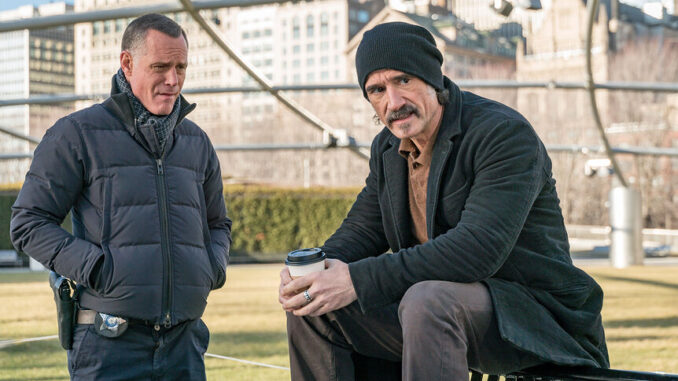
Few television characters leave as lasting an impression as Detective Alvin Olinsky from NBC’s Chicago P.D. Played with raw intensity and quiet humanity by Elias Koteas, Olinsky became the heart of the Intelligence Unit, a steady presence defined by loyalty, grit, and moral depth. From the show’s debut in 2014 until his heartbreaking exit in Season 5, Olinsky was not simply another cop in the unit—he was a symbol of resilience, friendship, and the blurred lines between right and wrong in the pursuit of justice.
From the beginning, Olinsky’s backstory set him apart. A veteran U.S. Army paratrooper and an experienced undercover detective, he carried with him the weight of years spent in dangerous, shadowy assignments. This history gave the character a hardened edge, yet Koteas infused him with a quiet compassion that resonated with viewers. As the loyal confidant of Sergeant Hank Voight, Olinsky was not only a trusted partner in the field but also a kind of moral compass for the often morally ambiguous leader of the unit. Their relationship—built on decades of friendship and shared battles—formed one of the emotional anchors of the show. When Voight pushed boundaries, it was often Olinsky who tempered his rage, reminding him of the cost of straying too far.
What made Olinsky truly compelling was his complexity. He was neither a spotless hero nor a villain; instead, he was a man caught in the gray areas of law enforcement. He bent rules when necessary, shouldered burdens for his colleagues, and carried out dangerous tasks with quiet determination. Unlike some of his flashier peers, Olinsky operated with understatement. He was never the loudest in the room, but his presence was always felt, his loyalty never questioned. That understated strength made him relatable and deeply respected—both by his fellow characters and the audience at home.
The decision to end Olinsky’s storyline in Season 5 sent shockwaves through the fandom. After being arrested for a crime tied to Voight’s personal vendetta, Olinsky was sent to prison, where he was fatally stabbed before evidence could surface to clear his name. The betrayal of justice—dying for a crime he did not commit—added a tragic dimension to his character arc. Fans were devastated, not only because they lost a beloved character, but because his death served as a sobering reminder of the costs of loyalty and the unforgiving nature of the world he inhabited. Elias Koteas delivered a powerful, nuanced performance in those final episodes, capturing both Olinsky’s stoicism and the quiet pain of a man facing an undeserved fate. It was a performance that lingered long after the credits rolled.

Though Olinsky’s physical presence ended in Season 5, his legacy continued to ripple through the series. His death reshaped Voight’s trajectory, weighing heavily on the sergeant as a reminder of how personal choices can devastate those closest to him. Years later, in the Season 11 finale, Elias Koteas made a surprise appearance in a vision experienced by a wounded Voight. That brief yet poignant moment brought the story full circle, reminding fans of the bond between the two men and cementing Olinsky’s place as one of the show’s most unforgettable figures.
Outside of Chicago P.D., Elias Koteas has built a career filled with memorable performances across film and television. His roles in The Thin Red Line, Crash, and The Curious Case of Benjamin Button showcased his versatility, while his ability to disappear into complex characters earned him critical respect. Yet for many fans, it is his portrayal of Alvin Olinsky that stands as his most iconic work—a role that captured the grit of Chicago’s streets while revealing the vulnerability of a man who lived by loyalty, even when it cost him everything.
In the end, Alvin Olinsky’s legacy is one of loyalty and sacrifice. Through Elias Koteas’ masterful performance, the character became more than just a detective on a police drama; he became a symbol of friendship, resilience, and the moral struggles faced by those who dedicate their lives to protecting others. His story may have ended in tragedy, but his presence continues to echo through Chicago P.D., a reminder that some bonds, and some legacies, never truly fade.
